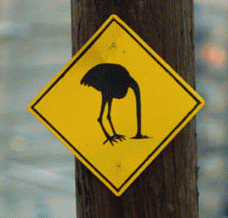Marco Island Ostriches Unaware of Important Findings

The Bad News
The November 2006 issue of Business 2.0 reports the Top 10 real estate markets in the country. Based on myriad factors from a study conducted by Moody’s Economy.com, the magazine reports “The Best Places To (Still) Invest” with the byline “… there are some great opportunities out there …” The study derived a rating of projected gain in home prices over the next five years.
Of the top ten places, three are in Florida. And not only are they in Florida, but they come in at the first, second and fourth places. The projected gain in home prices in the next five years for these three Florida cities are 72% for Panama City, 64% for Daytona Beach and 59% for Lakeland!
Why Is This Bad News?
Because this report is yet again another serious study using empirical data disproving the myths and hysterics of Marco Island’s real estate industry and its loyal cliques.
It is also unwelcome news because it shows that Marco doesn’t have studies supporting our economic trend while it relies on myths and suppositions.
In case you have missed them, here are some of the most popular Marco Island urban legends:
- “The real estate market is collapsing everywhere and hence that is why the real estate market has collapsed on Marco.” Not only is it not collapsing “everywhere”, but it’s not even collapsing in Florida. The exact opposite is true.
- “Hurricanes scared people away from buying/investing.” Really? And the above noted Florida cities are hurricane proof?
- “Interest rates are too high.” Doesn’t seem to be bothering anybody else.
- “The war and the elections.” Doesn’t seem to be bothering anybody else.
- “The malcontents on the island are stirring up trouble.” If societal evolution or economic progress is thwarted by angry citizens, New York City would be a vacant lot.
So What Is Going On?
The answer is found in 8th grade economics. If there is too much supply, prices drop.
And why is there too much supply? Because people are selling or wanting to sell faster than people are buying or wanting to buy.
And why are people acting this way?
How about unbridled growth? How about the cost of living becoming unbearable? How about because the City is moving away from a mixed economy/society of complimenting tourism, long term vacationers, retirees and middle class young families to an economy beholden to tourism and the business special interests that drive it to the detriment of everyone else? How about the wanton collapse and negation of the social infrastructure for the middle class? How about a government that besmirches and sues its citizens? How about a government that treats the existence of a toxic substance as the neurosis of a few malcontents?
Can This Be True?
Don’t take the word of a proven analyst. Consider these quotes – from the very same article that detailed the present real estate boom:
As related to Panama City, there is a footnote:
“Caution: Local politicians, notoriously cozy with builders, have green-lighted several master-plan communities for future development. If supply gets out of hand, prices will fall.”
And the coup de grâce: The article also notes where not to buy:
“Southwest Florida: A typical home goes for $500,000, and prices rose 25% last year. A local economy with a thin base – retirees – can’t sustain the heat.”
Are the analysts that derived this study and conclusion geniuses or fortune tellers? No, they merely used what has recently occurred in our area.
The Fix
It is unlikely that the novelty of Marco Island will ever return. The reason for such pessimism comes from how governmental and business leaders act and say.
These self-proclaimed soothsayers continually proclaim that since the unfettered growth of the past was the catalyst for Marco Island’s boom, unfettered growth has to work now. And because it’s not working, then it must be due to something else – a la the myths noted above.
But such thinking is irrational on its face. Every system has a tipping point, you can’t stretch a muscle beyond its limits, you can’t put ten pounds of sugar in a five pound bag, and nothing lasts forever.
Can things be turned around? Yes, though to do so would first require acknowledging the actual factors that influence our economy.
Summary
Can you now recognize the ostriches on the island?








1 Comments:
author's note:
it is a myth dating back to biblical times that ostriches stick their heads in the ground when wanting to hide.
but since we all recognize the analogy, why not use it to convey a point.
it's like saying that oswald killed kennedy. everyone believes it but its actually a myth.
By Mario R. Sanchez, Ph.D., at Friday, November 10, 2006 8:54:00 PM
Mario R. Sanchez, Ph.D., at Friday, November 10, 2006 8:54:00 PM
Post a Comment
<< Home